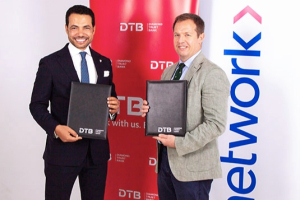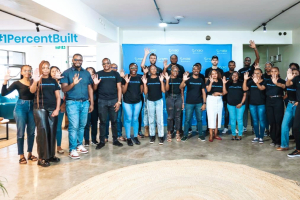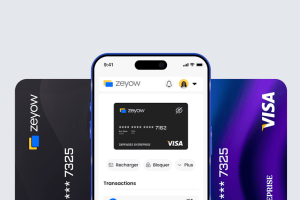Kenya: DTB Partners with Network International to Enhance Digital Payments
Kenya's Diamond Trust Bank (DTB), listed on the Nairobi Securities Exchange, has teamed up with Network International, a top digital commerce provider in the Middle East and Africa (MEA). The partnership, announced on July 23, aims to enhance DTB's digital payment solutions.
DTB, with over 155 branches in East Africa, aims to leverage Network's advanced payment solutions and security protocols amidst growing digital payment adoption. The partnership includes debit, credit, and prepaid card processing, e-commerce, fraud prevention, and more.
Zimbabwean Financial Firm Launches Platform to Improve Remittance Sector
Zimbabwean financial firm BARD Santner Incorporated launched TX Money Transfer on July 10. The new platform is designed to enhance reliability and transparency in the remittance sector.
BARD aims to improve transparency regarding charges to avoid hidden costs and foster collaboration to eliminate process bottlenecks.
With the launch of TX Money Transfer, BARD Santner aims to set a new standard in Zimbabwe's remittance sector, ensuring better service for clients and strong business returns.
Tanzanian Payments Company Nala Secures $40M Series A Funding
Nala, a Tanzanian payments company headquartered in Kenya, has raised $40 million in Series A funding, Founder and CEO Benjamin Fernandes announced on July 9, on X. The fund will support the company’s global expansion and enhance its payment systems in Africa.
Nala allows users to transfer money from the UK, US, and EU to Kenya, Uganda, Tanzania, Rwanda, and Ghana.
UNDP and Timbuktoo Africa Innovation Foundation Launch Fintech Hub in Lagos
Supporting and establishing youth-led tech startups can boost economic activities in finance, agriculture, and healthcare, contributing to overall growth on the continent. Such moves create jobs, address unemployment among Africa's youth, and provide livelihoods.
The UNDP and the Timbuktoo Africa Innovation Foundation launched the first Fintech Timbuktoo Hub in Lagos, Nigeria on July 9. This facility aims to drive innovation and growth within Africa's fintech ecosystem.
The moment is here!
— UNDP Nigeria (@UNDPNigeria) July 9, 2024
We are live at the launch of the premier #timbuktoo Fintech Hub.
Today, we are revolutionizing the future of fintech in Africa.
Join us: https://t.co/olFgxgSmlV pic.twitter.com/9i0oLVlBh8
Speaking during the launch, Ms Ahunna Eziakonwa, the UN Assistant Secretary-General and UNDP Regional Director for Africa,said: “Africa is the place where ideas comes from to unite the world. Our innovators are finding solutions to the most pressing global problems. timbuktoo is about changing the way development works and investing in young talents. I invite you all to join and begin to see Africa from the lens of opportunity."
Timbuktoo is a partnership between the UNDP, African governments, and the private sector, positioned as the world's largest initiative supporting Africa's innovation ecosystem and reshaping financial technology and development across the continent. Launched in January 2024 at the World Economic Forum in Davos and headquartered in Kigali, Rwanda, the initiative leverages collective power to create scalable and impactful conditions across Africa. Timbuktoo aims to mobilize and invest US$1 billion in capital to transform 100 million livelihoods and create 10 million dignified new jobs across African countries.
This hub, located at UNDP's Innovation Center in Lagos, isthe first of eight tech hubs, with additional hubs planned for 2024 in Kigali, Rwanda (Healthtech), Accra, Ghana (Agritech), and Lusaka, Zambia (Minetech). Forty-two young startups from 31 African countries have been selected for the first cohort.
The launch is pivotal to innovation and financial inclusion across Africa. It will serve fintech entrepreneurs, investors, and experts, offering collaborative workspaces, mentorship programs, and advanced technology to support startups across Africa in building impactful solutions.
Africa, with 60% of its population under 25, presents a fertile ground for innovation despite a low unique mobile subscriber penetration rate of 43% in 2022, according to the 2023 ‘Mobile Economy Sub-Saharan Africa’ report by GSMA. GSMA projects that by 2025, 634 million Sub-Saharan Africans (52%) will subscribe to mobile services, driving digital transformation.By nurturing local talent and fostering cross-border collaborations, the Timbuktoo Fintech Hub will play a pivotal role in shaping Africa's financial technology future, reflecting the UNDP's commitment to sustainable development through technology.
Hikmatu Bilali
Accelerex Launches "Pay with Fingerprint" Payment Solution in Nigeria
Accelerex, a leading African fintech company, has launched the “Pay with Fingerprint” solution, Nigeria's first biometric-enabled PoS payment system.
Designed to address card fraud and eliminate the need for physical cards, the technology allows bank account holders to make secure payments using their fingerprints at merchant locations.
Benin: Fintech Startup Zeyow Empowers Online Shopping with Virtual Cards
With over 150,000 users in its four years of existence, according to the startup's data, Axa Zara offers several fintech solutions to African populations. The startup aims to become one of the leading players in this segment in Africa.
Zeyow is a fintech solution developed by the Beninese startup Axa Zara, allowing users to create virtual bank cards for conducting online financial transactions. Founded in 2019 by Elias Mahugnon Missihoun, the startup operates out of Abomey-Calavi (Benin) and Abidjan (Côte d'Ivoire).
“Axa Zara’s mission is to create infinite opportunities through technology. By leveraging the potential of technology, our goal is to provide access to new possibilities, break down barriers, and enable people from all walks of life to achieve their professional goals,” the startup explained to We Are Tech Africa. It continued, “We focus on developing digital solutions that are not only effective but also inclusive, ensuring that no one is left behind in the digital revolution.”
Zeyow does not have a mobile app. Users must access the service through a web browser by visiting the Axa Zara website. To use Zeyow, users click on “create an account” and provide information such as name, email address, and phone number.
After this step, users can create their virtual bank card and perform online operations like shopping on e-commerce platforms or subscribing to services. The card can be recharged using various methods, including mobile money, which is popular among African populations.
Talking about its continental expansion plans, Axa Zara says: “We are actively looking to expand into other countries. This process involves a rigorous market analysis to pinpoint exactly where the needs lie. We consider the local ecosystem and all available opportunities to ensure that our intervention is not only relevant but also beneficial to the communities we aim to serve.”
Adoni Conrad Quenum
Futa Streamlines Money Transfers in Cameroon
After the failure of their first startup, two tech entrepreneurs decided to embark on a new venture. They turned to financial technologies, a popular segment on the continent. Then Futa was born.
Futa, a fintech solution developed by a Cameroonian startup based in Douala, enables users to send and receive money via mobile money, as well as pay for airtime and subscribe to telecom bundles. Founded in 2022 by Grace Jerolgan and Daniel Dang, the startup sees itself as more than just a payment app.
“Our goal is to build a modern bank for the modern African, enabling even a farmer in the remotest village to securely send and receive money, access loans, and even investment opportunities, with or without internet access,” the startup explains.
Currently, the app is available exclusively on Android, boasting over 5,000 downloads. For iOS users, access is provided through the web version of Futa. Users simply need to click on the ‘Install’ pop-up and follow the steps. This process installs a shortcut to the web app on the home screen, allowing users to use Futa just like any other app.
Once users register and create an account with their name, city, and phone number, they gain access to various services, including sending and receiving funds and purchasing plans. Notably, Futa enables users to manage multiple mobile money accounts from their dashboard. The fintech charges a fee ranging from 0 to 1.5%, depending on the type of transaction.
Futa reports having over 4,000 users, with more than 24,300 transactions processed through the app to date.
Adoni Conrad Quenum
Moneco Enables Seamless Euro Banking & Money Transfers within the African Diaspora
The financial solution was set up by three African tech entrepreneurs to assist African migrants in their transition to life in France.
Moneco, a fintech solution founded by three African tech entrepreneurs Algerian Bilal Dahlab, Beninese Jimmy Kuassi Kumako, and Malagasy Shams Radjabaly was launched in 2022. The France-based startup, which raised approximately $1 million for technology development and growth, allows users to open a euro account, obtain an international VISA payment card, and make transfers throughout Europe or between Moneco users.
The Moneco mobile application, available on iOS and Android, requires users to create an account using a passport and a selfie. A physical address in France is necessary to complete the account creation process. Once the account is set up, users can order a Visa card for payments and other financial transactions. Moneco’s ultimate goal is to serve as a comprehensive financial resource.
The Moneco debit card is priced at €20, with a monthly fee of €1.5. Withdrawals outside France but within the Euro zone also incur a €1.5 fee. Transfers, account maintenance, direct debits, transfers to another Moneco user, card payments within the eurozone, and account opening are all free of charge.
Moneco took part in the Summer 2022 cohort of the Californian accelerator Y Combinator. Since its launch, the Android version of its mobile application has been downloaded over 5,000 times, according to the Play Store.
Adoni Conrad Quenum
In Cameroon, agritech solution Freshbag supplies cities with fresh food
The digital solution was set up to facilitate the supply of goods to retailers.
Freshbag, a Cameroonian startup, has developed an agritech solution that serves as a bridge between producers or agricultural cooperatives and small retailers. The startup, founded by Brice Ludovic Bindzi Mvogo, received an undisclosed amount of funding in 2020 from GreenTec Capital, an investment fund launched in Germany in 2015 by Cameroonian-born Frenchman Eric Yong to support startups and SMEs.
Bindzi Mvogo expressed his gratitude for GreenTec Capital’s support, stating, “Thanks to Greentec, we now have a real opportunity to move into growth mode, scale our operations, and ultimately create a greater impact for the millions of street vendors across Africa. A dream now closer to becoming a reality.”
The solution does not require a mobile application. Interested parties can directly register on the startup’s web platform as sellers to join Freshbag’s network of distributors, or as producers to supply fresh produce. Following registration, the startup conducts site visits for the usual checks and to sign a partnership agreement with the user.
In September 2020, Bindzi Mvogo acknowledged the daily challenges faced by the startup stating, “The main risks are linked to the people we serve. Informal street vendors - because they live in constant uncertainty - are often unreliable and reluctant to commit to formal contracts. Our loyalty and reward programs are gradually helping to solve this problem, but we still have a long way to go to change attitudes and behavior.”
Freshbag currently boasts around 1,600 producers and 700 sellers but it plans to expand beyond Cameroon to other countries in sub-Saharan Africa.
Adoni Conrad Quenum
Congo: MaxiCash Facilitates Payments and Money Transfers for the Diaspora
According to its co-founder, Ruddy Mukwamu, MaxiCash was inspired by the Apple ecosystem.
MaxiCash, a fintech solution developed by a Congolese startup, is enabling Africans in the diaspora to make payments, transfer money internationally, and pay for various goods and services. The startup, launched in 2016 by Ruddy Mukwamu, is based in Kinshasa, Democratic Republic of Congo, and Johannesburg, South Africa.
“We combined our experience in tech and digital to help communities use technology to foster financial inclusion,” Mukwamu said.
The MaxiCash mobile application, available on iOS and Android, allows users to create an account and access various fintech services. Users can send money internationally, make payments, and shop online in partnership with MaxiCash. The application includes a digital wallet, which can be topped up using various digital payment methods, including bank cards.
MaxiCash also offers Visa bank cards for online payments and receiving international payments. The start-up provides a payment gateway for businesses, enabling those involved in online commerce to integrate MaxiCash’s payment solution to facilitate their financial transactions. According to the Play Store, the application has been downloaded more than 10,000 times.
Adoni Conrad Quenum











